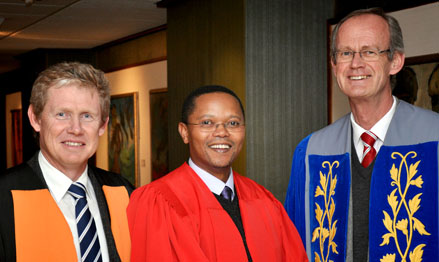Latest News Archive
Please select Category, Year, and then Month to display items
11 September 2024
|
Story Anthony Mthembu
|
Photo Anthony Mthembu and Chelsea Carolus
 From the left: Geraldine Lengau, Senior Officer in the Unit for Institutional Change at the UFS; and Oratile Reina, West College Prime.
From the left: Geraldine Lengau, Senior Officer in the Unit for Institutional Change at the UFS; and Oratile Reina, West College Prime.
As part of the initiatives lined up for College Week, the student leaders of West College at the University of the Free State (UFS) hosted a dialogue that primarily focused on discussing social justice as a value of Vision 130. The dialogue was held at Outeniqua Residence on 3 September 2024 and was well attended by students within West College.
According to Oratile Reina, West College Prime, “the motivation for the dialogue was to prepare newly elected leaders and our college community to align their efforts with Vision 130 – a vision that aims to create a more inclusive, equitable, and socially just environment on campus”. As such, she highlights that the dialogue was an opportunity for leaders to discuss practical strategies for implementing these values in their respective spaces, and to encourage those in West College to become better citizens inside and outside the university.
A conversation on social justice
The dialogue was facilitated by Geraldine Lengau, Senior Officer in the Unit for Institutional Change and Social Justice at the UFS. Lengau touched on several aspects pertaining to the topic of discussion. Firstly, she allowed the audience to give their definition of social justice, especially as students within the institution. In addition, she went on to talk to the audience about sexual assault in the context of social justice. In this instance, Lengau gauged whether the students knew which processes to follow in the event of a sexual assault incident, and whether they were acquainted with the UFS Sexual Harassment, Sexual Misconduct, and Sexual Violence Policy. Furthermore, the audience was given the opportunity to outline what social justice looks like to them in the spaces they occupy, including in their respective faculties, the sports they play, and the leadership structures they form part of. “I was encouraged to see that students take their right to a socially just university in very high regard, and that they were willing to break it down from what Vision 130 proposes, in order to align it with their common understanding,” said Lengau.
As the dialogue concluded, the audience signed a pledge committing to uphold the values of Vision 130. According to Reina, “The pledge represents a promise to take concrete steps towards fostering an inclusive and equitable campus culture. By signing the pledge, the leaders are not only agreeing to embody these principles in their leadership roles but are also holding themselves accountable to their peers and the broader university community.”
Inaugural lecture by Prof Kwandiwe Kondlo
2011-08-26
|

|
|
Present at the inaugural lecture of Prof Kwandiwe Kondlo were from the left: Prof. Lucius Botes, Dean of the Faculty of Humanities; Prof. Kwandiwe Kondlo and Prof. Teuns Verschoor, Vice-Rector: Institutional Affairs
Photo: Stephen Collett
|
Can the South African Communist Party (SACP) ever become a viable option for the ANC or has it become just a flat spare-tyre of the ruling party? Is there more to expect from the SACP or has it run full cycle? These are some of the questions that were brought up by Prof. Kwandiwe Kondlo at his inaugural lecture at our university on 24 August 2011.
Prof. Kondlo, head of our Centre for Africa Studies, told the audience that the current SACP (unlike pre-1994) is a party in which theory and intellectual reflection were being eclipsed by politics of pragmatism and warned that self-interest and ambition have become a problem. Delivering his lecture on the topic The South African Communist Party and the Dilemma of the National Democratic Revolution in South Africa, 1994 to date, Prof. Kondlo warned that he may ruffle feathers amongst those with ideological commitments and said that as an intellectual it was his job to irritate.
Prof. Kondlo told the audience his lecture would re-open old debates telling them that old questions are making way to the fore, for example the nationalisation debate.